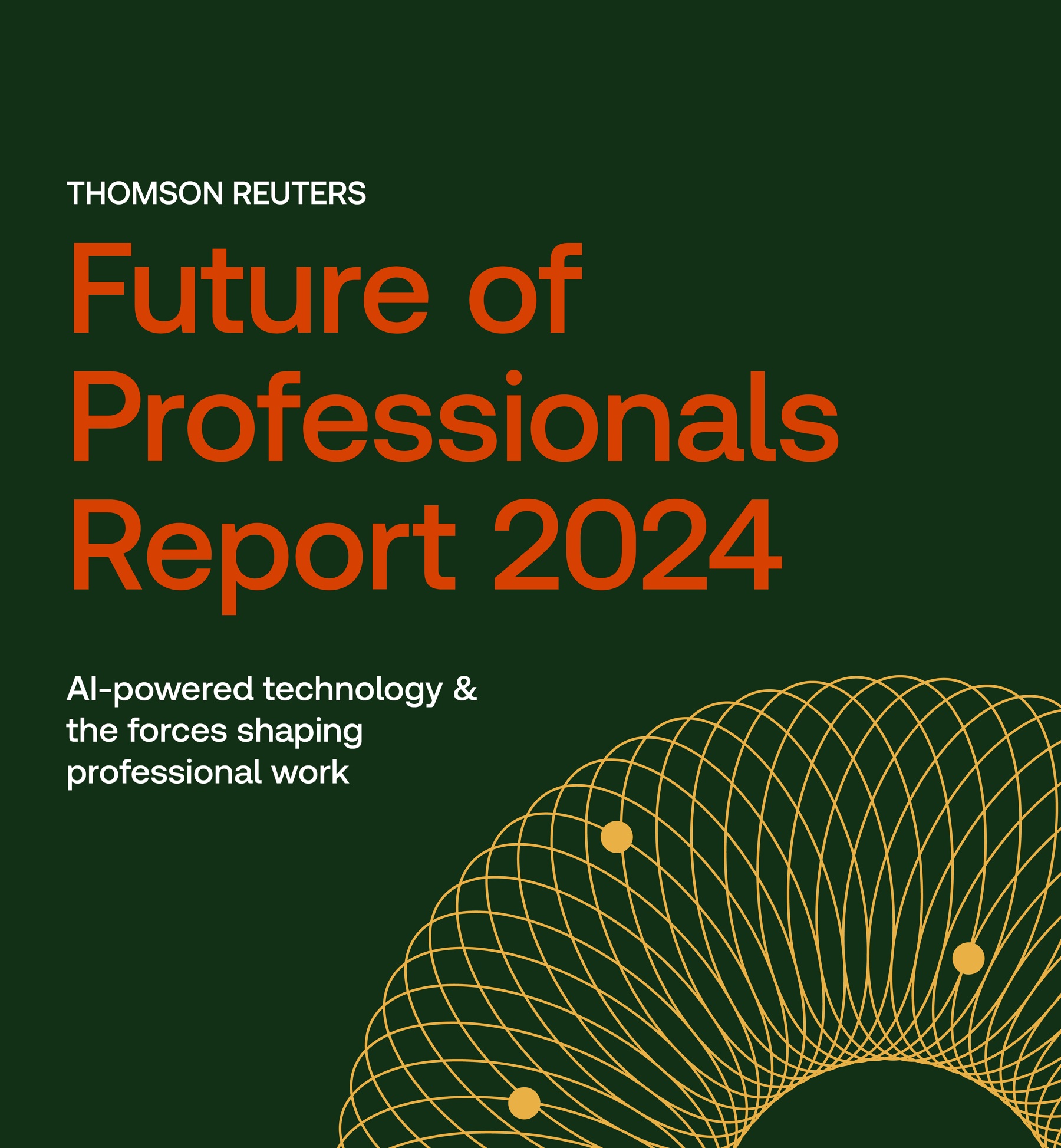Today, the sizable impact of artificial intelligence (AI) and generative AI (GenAI) is not only beginning to be felt by many professionals, but its already changing how companies and firms are conducting their operations now and how they will do so in the future.
The recently released Thomson Reuters 2nd annual Future of Professionals Report — based on a survey of more than 2,200 professionals across the legal, tax, trade, accounting, and risk, fraud & compliance fields, and within individual firms, corporate functions, and government agencies around the world — showed that more than three-quarters (77%) of all survey respondents said they believe AI will have a high or transformational impact on their work over the next five years.
 |
Yet, perhaps most interestingly, the report found that it was members of corporate C-Suites — the executives and managers that run many corporations — that may be outpacing others in their acceptance and early use of these innovative technologies. The report illustrated how C-Suite members are already using AI to start work tasks at a higher rate than many legal, risk, or tax professionals, threatening to leave their outside legal and tax firms and in-house functions behind.
Differing take-up of GenAI
As a whole, many professionals have begun to engage AI early in their work processes, but as the report notes, corporate C-Suite respondents are approaching and perceiving AI in a completely different way from other professionals, including those who see C-Suite members as their clients.
According to the report, a whopping 82% of C-Suite respondents said they have used AI to start work at least once. Further, 60% have used AI to start work tasks several times, and 24% are using AI to start their work tasks regularly.
Yet, the portion of professionals who said they have used AI to start any task in both legal and tax sits at 60% — more than 20 percentage points lower than their C-Suite counterparts. Meanwhile, the portion who say they regularly use AI to start tasks is just 10% in each of legal and tax — less than half the portion of C-Suite respondents.
Of course, there could be several key reasons why legal and tax professionals — even those who work within in-house corporate functions — are not as open to taking up more widespread use of AI in their work operations even though AI can save professionals time to achieve more.
C-Suite members, for example, may have the freedom to pursue more cutting-edge solutions to problems, effectively setting an example for others in the organization to follow. For many legal, tax, and risk professionals — especially those in internal corporate roles — it may simply be a matter of risk aversion.
Indeed, according to the report, almost half of the legal industry respondents surveyed who said they aren’t using AI to start tasks cited as the main reason they worry about the tools’ accuracy; and many tax & accounting professionals who said they aren’t using AI as a starting point said they do not have the time or capability to explore those tools in the first place.
This could be a problem for many within the legal and tax & accounting professions because it’s clear corporate C-Suite members have had success with AI tools and intend to keep on using them in some form. According to the report, of those respondents within C-Suites who said they have used AI as a starting point at least once, 74% called it at least a strong starting point, if not better.
Where do C-suites see the value in AI use?
While the report clearly shows that the top executives of many companies are more inclined to use and experiment with AI-driven technologies in their work operations, it may be useful to understand where C-Suite members see the most value in AI-driven tech in their work.
When C-Suite executives were asked in what specific strategic areas they saw AI and GenAI having the largest impact, 59% said their operational strategy, followed by product/service strategy (53%) and talent strategy (40%). This indicates that corporate C-Suite members are more focused on how the output of AI-driven tech tools will impact the efficiency and cost of their operations, as well as their customers and employees.
And that means, we could see corporate leaders pushing both their outside and internal legal, tax, and risk professionals to leverage AI in the same forward-looking way that they are, by urging these professionals, for example, to use AI tools to improve the efficiency of their internal operations and lower costs for the company as a whole. We could also see top C-Suite members attempting to leverage AI technologies in their customer-facing operations in order to create a more satisfying consumer experience.
As time passes, there will continue to be new ways to work. In whatever way they choose to drive the advantages of AI and GenAI in their corporate operations, it appears C-Suite members already seem more sold on the value of new technologies than many of the professionals that work in corporate law, tax, and risk functions, according to the report. And that means, professionals in those roles — either in-house or at outside firms — need to realize that if they continue to hesitate, they may be playing catch-up with their clients on the use of these advanced AI-driven innovations.
Download the Thomson Reuters 2nd annual Future of Professionals Report.
 |
Thomson Reuters is not a consumer reporting agency and none of its services or the data contained therein constitute a ‘consumer report’ as such term is defined in the Federal Fair Credit Reporting Act (FCRA), 15 U.S.C. sec. 1681 et seq. The data provided to you may not be used as a factor in consumer debt collection decisioning, establishing a consumer’s eligibility for credit, insurance, employment, government benefits, or housing, or for any other purpose authorized under the FCRA. By accessing one of our services, you agree not to use the service or data for any purpose authorized under the FCRA or in relation to taking an adverse action relating to a consumer application.










